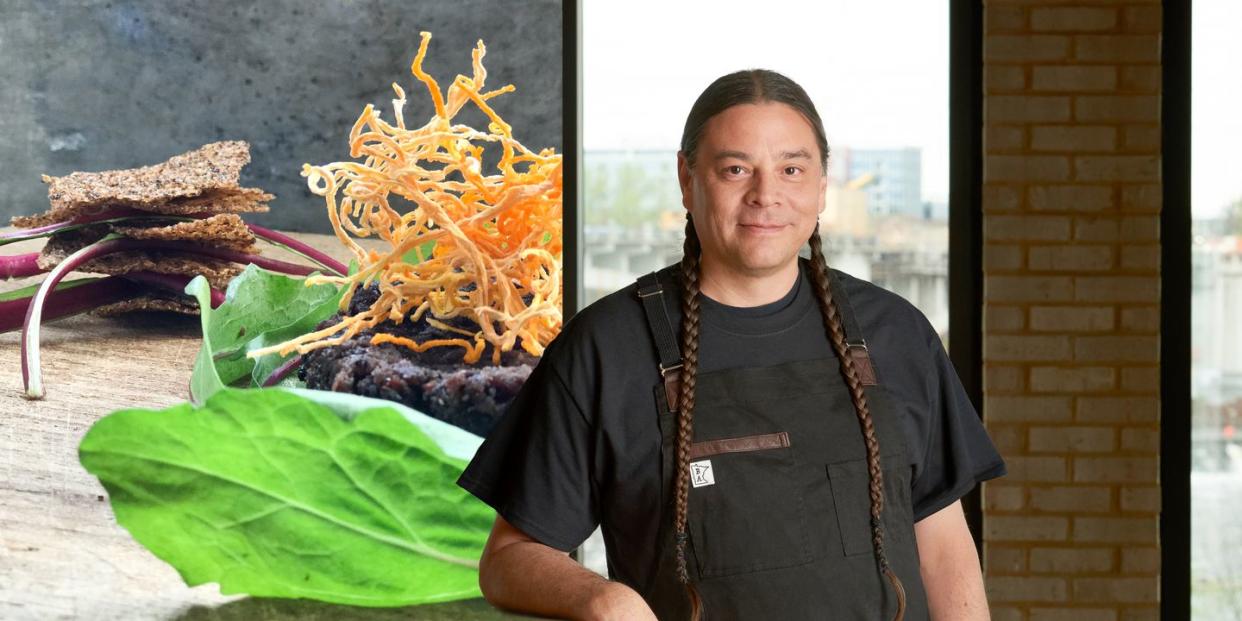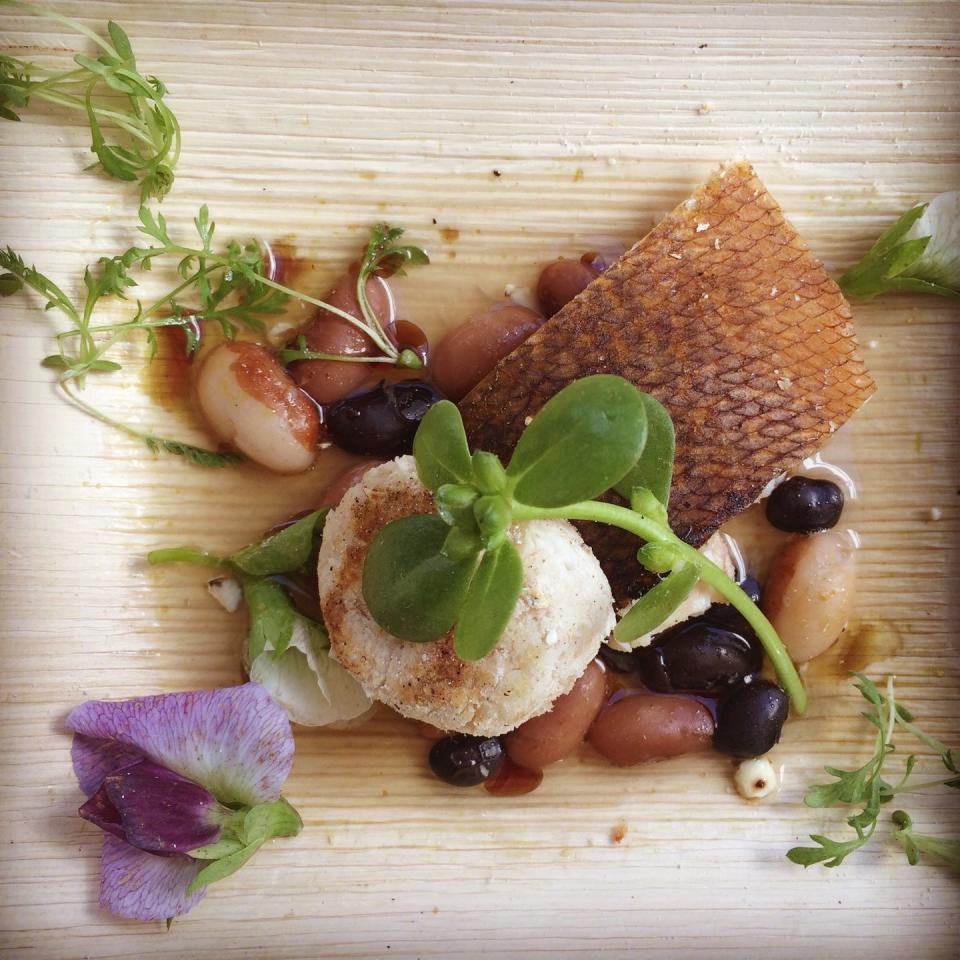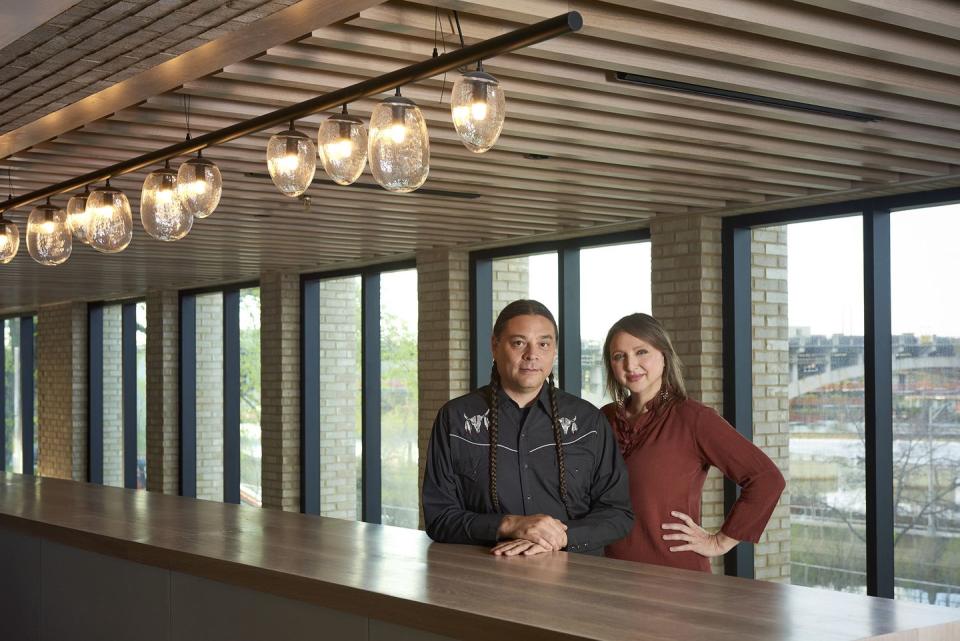The Man Who Sees a Future Where Indigenous Foods Are as Ubiquitous as Burgers

- Oops!Something went wrong.Please try again later.
- Oops!Something went wrong.Please try again later.
It takes a certain level of bravery to open a restaurant during a pandemic. Then there’s the outright audacity required to open one of America’s first Indigenous-focused, fully decolonized restaurants during a pandemic in Minneapolis—a city that, with George Floyd’s murder a year ago, became a Midwestern microcosm of America’s racism problem. A city where this spring, while residents simultaneously tried to stop the collective bleeding and brace themselves for the fallout of the Derek Chauvin trial, Daunte Wright was slain just miles away in a devastating episode of déjà vu. The same city where in 2018, the so-called Wall of Forgotten Natives became Minnesota’s largest pre-pandemic homeless settlement. And where in 2017, a prestigious arts center sparked great controversy with its “Scaffold” sculpture, a work by a non-Indigenous artist that replicated the gallows where 38 Dakota men were hanged in nearby Mankato in 1862, in what remains the country’s largest mass execution. In short, this is a city where Black, Brown, and Indigenous people have come to question if they are welcome, let alone celebrated.
And yet, opening that restaurant is exactly what chef Sean Sherman is doing. When Owamni by The Sioux Chef (Sherman’s educational and catering business) begins serving in early June, the fare will be made exclusively with Indigenous ingredients and without any colonial ones—meaning no wheat flour, cane sugar, dairy, beef, pork, chicken, or other foods that did not exist in America before white people stepped onto this soil. Though the 47-year-old Oglala Lakota chef and activist dubs Native American foods “ironically foreign”—they grow right underfoot yet somehow seem exotic to the average American—his cooking feels soothingly familiar. He lovingly braises bison with fresh cedar and hominy; boils hand-harvested wild rice with sour cherries and maple syrup; and tosses foraged dandelion greens into soups and salads. A soft-spoken man, recognizable for his warm smile and duo of long black braids, Sherman exudes excitement when discussing the Indigenous ingredients he uses, enough so that a touchy topic like colonialism becomes appropriate dinner table conversation fodder.
With Owamni, Sherman is continuing a food sovereignty revolution he’s been working on since 2008, determined to revitalize Indigenous meals and make them as ubiquitous as American classics like burgers and fries. After all, representation matters, even on our plates, and particularly in Minneapolis.
On that day last May when Darnella Frazier’s gruesome video of the final minutes of Floyd’s life went viral, Minneapolis started to buzz. As soon as he heard the news, Sherman headed toward the chaos, not away from it, down to what is now known as George Floyd Square, not far from his South Minneapolis home. There, a gathering—and a sense of outrage—was growing. “There was this collective anger that fused everyone together and made us all ask, ‘What can we do now?’” he recalls.
During the unrest that followed, Sherman felt compelled to help his aching community the best way he knew how: through food. Within weeks, The Sioux Chef team was cranking out hundreds of meals a day to combat new Twin Cities food deserts that had developed overnight, as grocery stores and restaurants were looted and burned to the ground. Sherman would load up his pickup with grain bowls for a growing homeless encampment at nearby Powderhorn Park and hand out hot soup to people on the streets. Even in this time of emergency, he kept an intentional focus on serving inherently nutritious Indigenous ingredients, like wild rice, quinoa, bison, duck, turkey, and seasonal produce from area farmers.
“We were just doing one small part that could be felt by making healthy food accessible to all these people—particularly the kids,” Sherman says. “These little kids would just light up when they would get some real food. When I’d stop at these homeless encampments, people would tell me, ‘Thanks for the real food; somebody just dropped off three garbage bags of white bread.’ That’s not food. You can’t survive off of it.” He saw that white bread, devoid of meaningful nutrition, as part of the broken food system that tribal communities have long been stuck in.
“Nutrition shouldn’t be based on your skin color or your zip code,” Sherman says. But for tribal members spread across the country, the urban poor, and Sherman himself, it so often is.

Sherman grew up on South Dakota’s Pine Ridge Reservation, one of the poorest communities in America, where he had little connection to the foods of his ancestors. Instead, he and his family subsisted on a diet of government supplemental fare, which he credits for the health problems—obesity, heart disease, type 2 diabetes—plaguing Native Americans today. At 13, he got a job washing dishes and busing tables at a nearby steakhouse that led to an affinity for cooking and an eventual move to Minneapolis. As he gained experience in restaurant kitchens preparing European cuisines, he wondered: Why didn’t he know more about the food systems and practices of his own people?
And so he embarked on a years-long endeavor to better understand Native American foodways, learning from elders, historians, and ethnobotanists along the way. Since launching The Sioux Chef in 2014, he has championed the original North American food system, one rooted in harvesting wild plants, employing sophisticated agricultural practices, and preserving seed diversity. He has served hundreds of Indigenous-focused meals, presented to vast and varied audiences (including TEDx Sioux Falls and the Culinary Institute of America), and cowritten a James Beard Award–winning cookbook devoted entirely to Native American recipes. Alongside his life/business partner Dana Thompson (herself a Dakota descendant), he founded the nonprofit North American Traditional Indigenous Food Systems to address tribal health and economic crises, which in turn opened a training and production kitchen called the Indigenous Food Lab last summer, as plans for Owamni’s opening moved forward.
They are not alone in their mission—grassroots efforts support it across the country. As Sherman points out, there are 574 recognized tribes in the United States, each with its own history and traditions. But through the events following Floyd’s killing and a year of racial reckoning, Sherman and Thompson’s dedication to their state remained unwavering. To that end, the Indigenous Food Lab currently produces some 10,000 free meals a week that get distributed to nine of Minnesota’s 11 tribal communities.
Sherman and Thompson believe that the kind of culturally relevant food they dish out can help heal trauma, both collective and generational. Thompson points to recent epigenetics research suggesting that trauma can be passed down through three generations and possibly result in biological changes that affect longevity and wellbeing. “Not only can people not see the generational trauma that was handed down to them, but people on the other end of the spectrum can’t see the generational privilege that was handed down to them,” Sherman says. “That generational privilege was often the direct result of either theft of Indigenous land or the use of African American slave labor. The United States conveniently ignores this, as do so many people in power today.”

They never doubted that Minneapolis—a city that’s been forced to very publicly reckon with its marked racial inequities, among the worst in the country—was the right place for a fully decolonized restaurant. “Every city is,” Thompson says matter-of-factly. That’s key for their larger hope: that one day you can drive across North America—the U.S. borders are colonial constructs, Thompson asserts—and experience the rich culinary and cultural traditions of the tribal communities specific to those lands. They envision their Indigenous Food Labs dotting the map and empowering local entrepreneurs to serve as stewards of ancestral knowledge. And why stop there? “One day, we could have them in New Zealand, Southeast Asia, and Africa,” Sherman muses.
Here in his hometown, The Sioux Chef tradition of pairing food with knowledge will continue at Owamni. “There’s so much power in food,” Sherman explains. “A lot of cultural identity is wrapped up in food, and it’s an easy way to tell stories. The food we’re serving at Owamni tells the story of where it’s from, how it got here, and who you’re supporting by buying it.” In a quite literal take on reclamation, Owamni is housed in a former riverfront mill along the mighty Mississippi in downtown Minneapolis and takes its name from the Dakota word for the waterfalls it overlooks. Diners can admire the sacred site while feasting on sage-smoked turkey, northern pozole, and three sisters salad. They can learn about the cultural and medicinal significance of Indigenous ingredients from the menu and the Owamni team. They can sign up for a cooking demonstration on how to make cedar maple tea, or a plant identification tour that weaves through the endemic flora on the grounds. And while they’re feeding themselves, they’re also feeding their community, as the eatery’s profits will help power Sherman’s charitable and educational initiatives.

Perhaps most importantly, restaurant goers will be urged to join in a long-overdue conversation about colonialism—how it all but destroyed Native American cultures and foodways, and how doing anything but facing its residual privileges perpetuates a cycle of injustice. “Just taking the time to taste and to learn gives people an opportunity to think about the wrongs that have happened,” Sherman says. “It gives us an opportunity to talk about history from an Indigenous perspective and to acknowledge these atrocities that have been wiped off our history books. And it gives people an opportunity to realize a lot of issues are still alive out there.”
For two other James Beard winners who’ve shaped the Twin Cities culinary landscape, Owamni’s debut is indeed cause for celebration. “Owamni is an open-armed invitation for Minnesotans to gain a better understanding and appreciation of the history and traditions of the Native American community through Sean’s unique culinary lens,” says Ann Kim, the chef behind expectation-defying eateries like Young Joni, Pizzeria Lola, and the new Sooki & Mimi. Gavin Kaysen, whose Spoon and Stable has brought him national acclaim, echoes that enthusiasm: “What makes Sean’s project impactful and important is that he is giving both his cuisine and this community a sense of place through his ingredients and cooking techniques. He has nothing but the best intentions of telling his story in a genuine, meaningful way.”

Join Esquire Select
Sherman recognizes that his mission, which extends far beyond a plate of food, could someday land him in public office. “I think a lot of this has to take place on a political stage, because Indigenous communities have rarely had voices in government,” he explains, pointing to Interior Secretary Deb Haaland’s historic confirmation as progress. In fact, he grew up around politics, with his mother making a run for South Dakota state senate in 1988, nearly beating out an incumbent Republican as a young, Indigenous single mother.
With the landmark conviction of Derek Chauvin for the murder of George Floyd, Sherman’s bruised and battered city now serves as an unexpected harbinger of change in America. Sherman is encouraged by the trial outcome. He also emphasizes that the United States has “a long way to go in the fight against white supremacy and toward an equitable justice system.” For his part, he is making one more stride toward a postcolonial future via his precolonial fare. It’s like he always says: “If you can control your food, you can control your destiny.”
You Might Also Like
